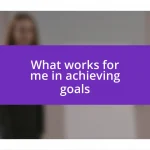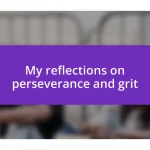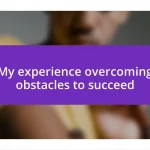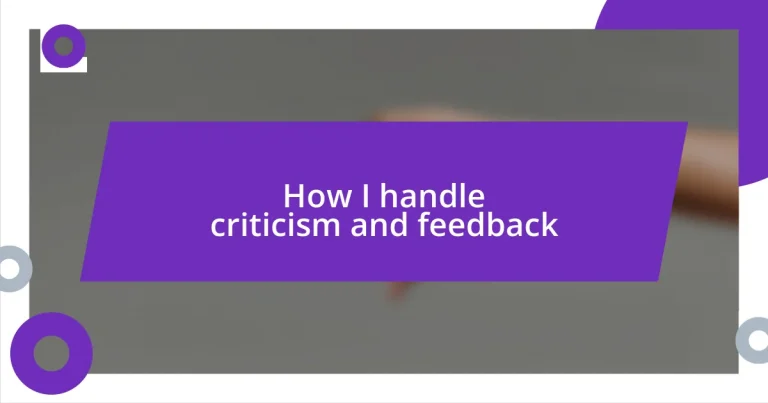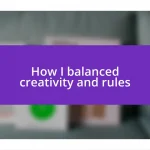Key takeaways:
- Constructive feedback is vital for personal and professional growth, fostering collaboration and trust within teams.
- Approaching criticism with an open mind and using techniques like active listening and self-compassion can transform feedback into a positive learning experience.
- Building resilience through reframing feedback as growth opportunities helps maintain confidence and motivates ongoing improvement.
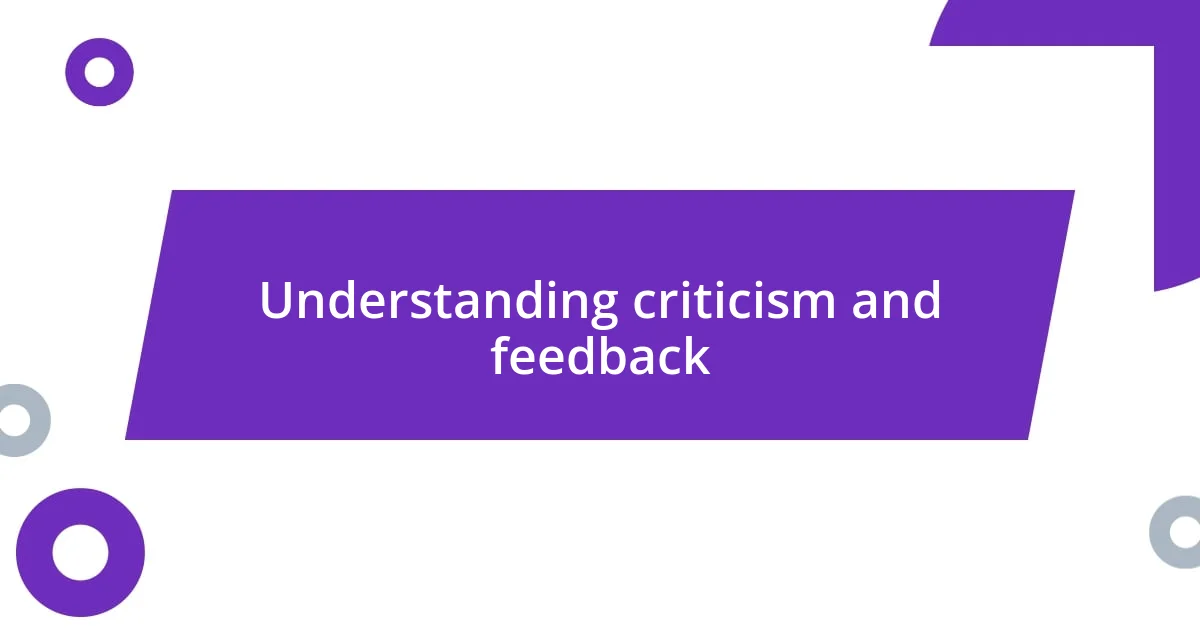
Understanding criticism and feedback
Criticism and feedback can often feel like a double-edged sword; they can hurt, yet they serve as a mirror that reflects our actions and choices. I remember a time when I received feedback on a project that I thought was my best work. At first, my instinct was to defend myself, but then I paused to ask, “What can I learn from this?” That moment of reflection changed my perspective completely.
Understanding the difference between constructive criticism and personal attacks is crucial. I’ve experienced harsh comments that felt personal, but I had to remind myself that not all feedback is intended to hurt. When I started viewing constructive feedback as a tool for improvement, it transformed my approach and helped me grow, both personally and professionally.
Sometimes, it helps to view feedback as a conversation rather than a confrontation. I often ask myself if the feedback can be an opportunity for deeper insight. When a colleague once criticized my presentation style, instead of feeling deflated, I asked them for specific examples of how I could improve. This simple shift allowed me to gain invaluable insights and turned a potentially negative encounter into a learning experience.
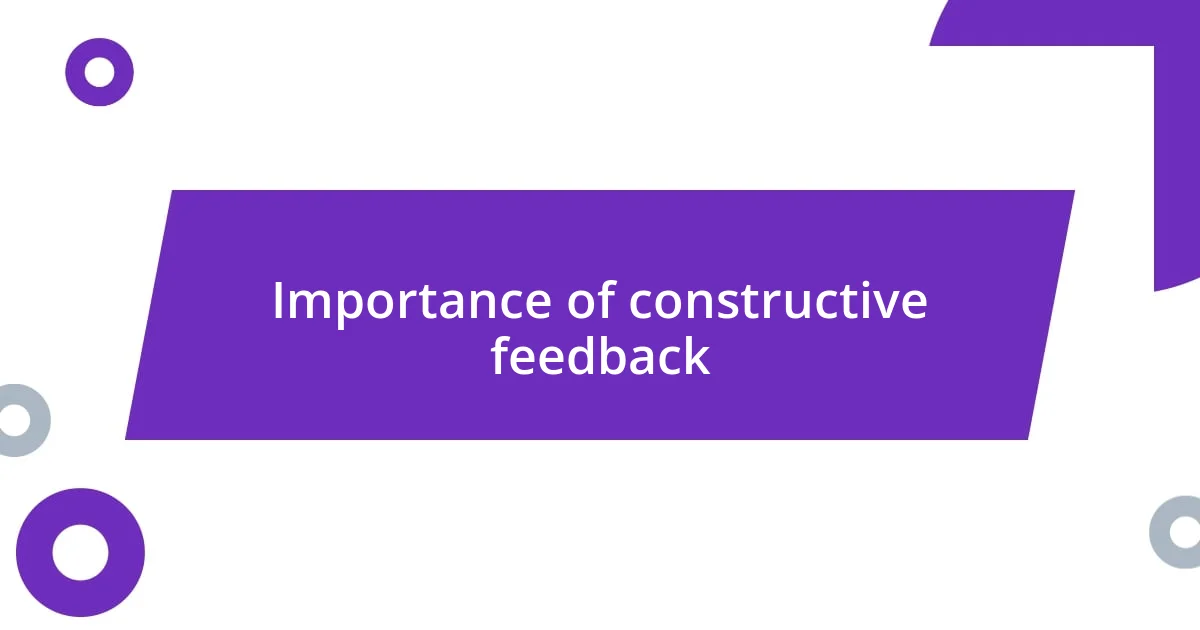
Importance of constructive feedback
Constructive feedback is essential because it not only highlights areas for improvement but also fosters personal growth. I vividly remember a time in my career when my manager provided feedback after a major presentation. Initially, I felt a wave of defensiveness wash over me, yet as I listened, I recognized that they were offering guidance to help me enhance my skills. By embracing this advice, I was able to refine my presentation style, which ultimately led to a significant promotion.
Furthermore, constructive feedback creates a culture of collaboration and trust. I’ve often found that when teammates feel comfortable sharing feedback, it leads to stronger team dynamics. One particular instance comes to mind: during a group project, our brainstorming sessions were enriched by openly discussing each other’s ideas. This openness did wonders for our end result, illustrating how valuable constructive feedback can be in a team setting.
The correlation between constructive feedback and performance improvement cannot be overstated. I recall a workshop I attended focused on effective communication skills. The instructor encouraged us to welcome feedback as a personal roadmap. By engaging with this principle, I’ve noticed that I not only respond better to critiques but also seek them out proactively, seeing them as opportunities for continuous development.
| Constructive Feedback | Destructive Feedback |
|---|---|
| Focuses on improvement | Targets the person |
| Encourages growth | Creates defensiveness |
| Builds trust | Erodes relationships |
| Promotes collaboration | Stifles communication |
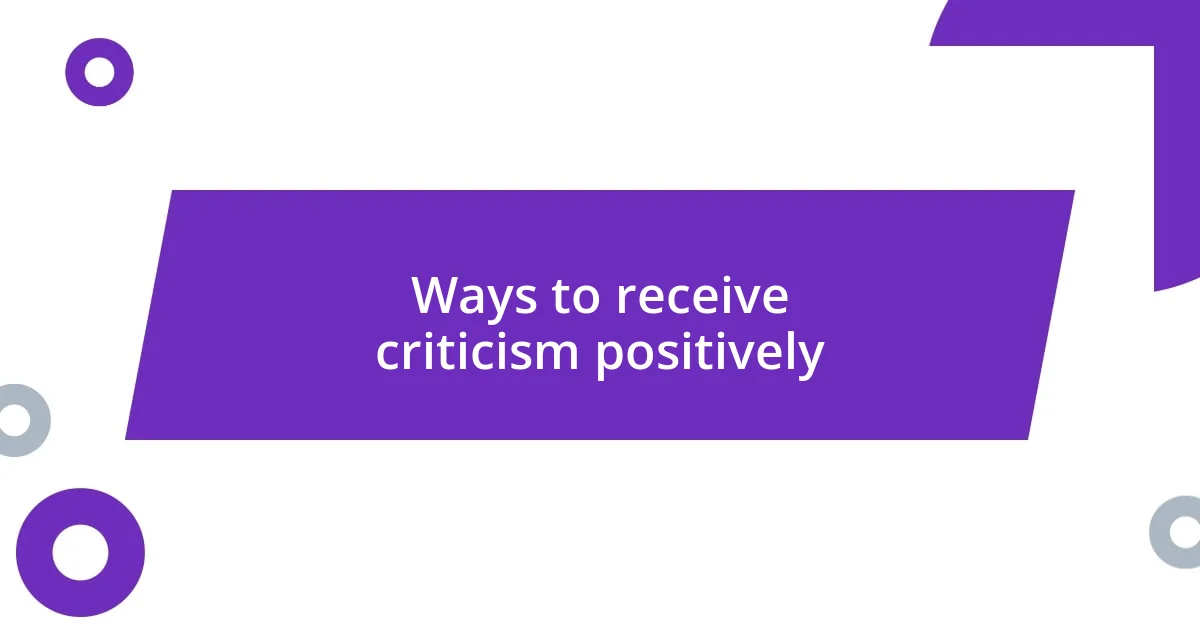
Ways to receive criticism positively
Receiving criticism positively can often feel like a challenge, but I’ve learned that approaching it with an open mind transforms the experience. One time, after working tirelessly on a project, I presented my ideas to my team. When the feedback came back, it stung a little, but instead of shutting down, I chuckled and said, “Alright, hit me with your best shots!” This light-hearted response opened up a dialogue and helped me enjoy the process of refining my work.
Here are some ways to embrace criticism with positivity:
- Listen actively: Make a conscious effort to really hear what’s being said without preparing your defense.
- Ask questions: Engage with the feedback by asking clarifying questions like, “Can you explain why you feel that way?”
- Practice gratitude: Express thanks for the feedback, even if it feels harsh. This shifts your mindset from resistance to appreciation.
- Reflect and assess: Take some time to mull over the feedback. I often jot down my thoughts afterward to see what truly speaks to me.
- Incorporate change: Actively apply the feedback to improve your work. Sometimes, I find myself excitedly integrating fresh ideas into my next project.
Each of these methods has helped me see criticism not as a setback but as a stepping stone to something greater.
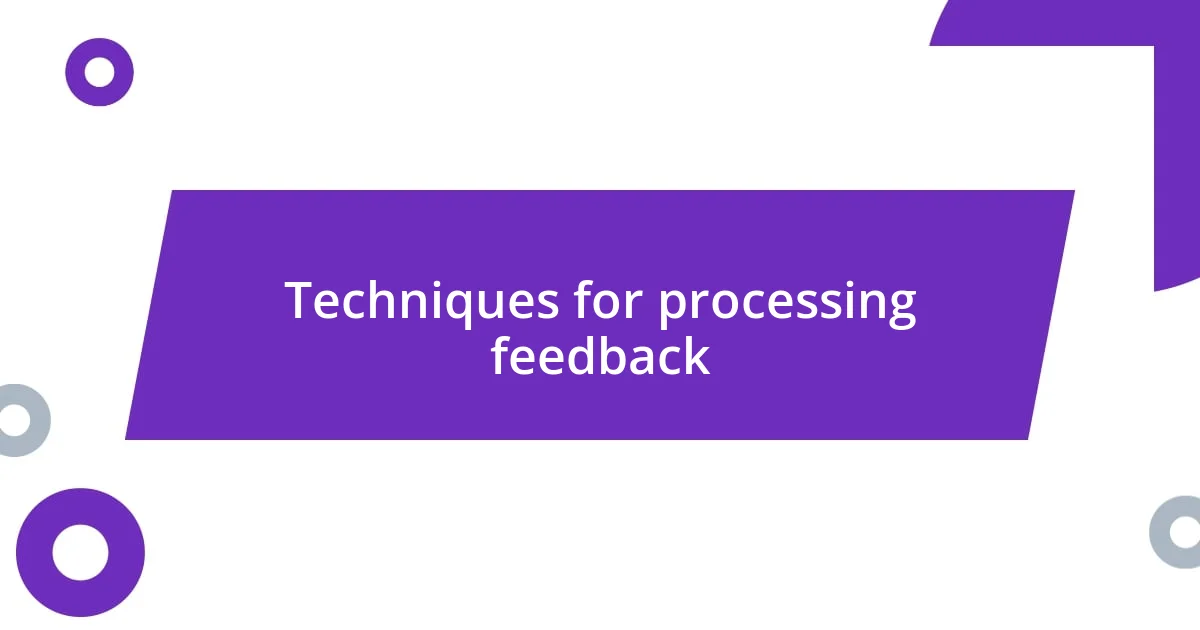
Techniques for processing feedback
Processing feedback effectively can feel daunting, but I’ve found that taking a moment to breathe before responding can work wonders. I remember a time when a colleague critiqued a project I was passionate about. Instead of reacting immediately, I paused and asked myself, “What part of this feedback can genuinely help me improve?” This mindset shift allowed me to engage more thoughtfully and turn a potentially negative experience into a positive learning opportunity.
Another technique I swear by is journaling my reflections after receiving criticism. After a particularly tough feedback session about my leadership style, I took some quiet time to write down my thoughts and feelings. This practice not only helped me process my emotions but also revealed patterns and areas I’d never considered before. It’s amazing how putting pen to paper can clarify thoughts and lead to actionable insights.
Finally, I actively remind myself that feedback is a gift. I often share this perspective with peers because it’s so easy to forget. When I received critical feedback on a project that I poured my heart into, I initially felt deflated. But by framing it as an opportunity to refine my approach, I shifted my perspective. This simple act of re-framing made all the difference, transforming a painful moment into a catalyst for growth. How do you see feedback as a tool for your development? I genuinely believe it has the potential to unlock doors that we didn’t even know existed.
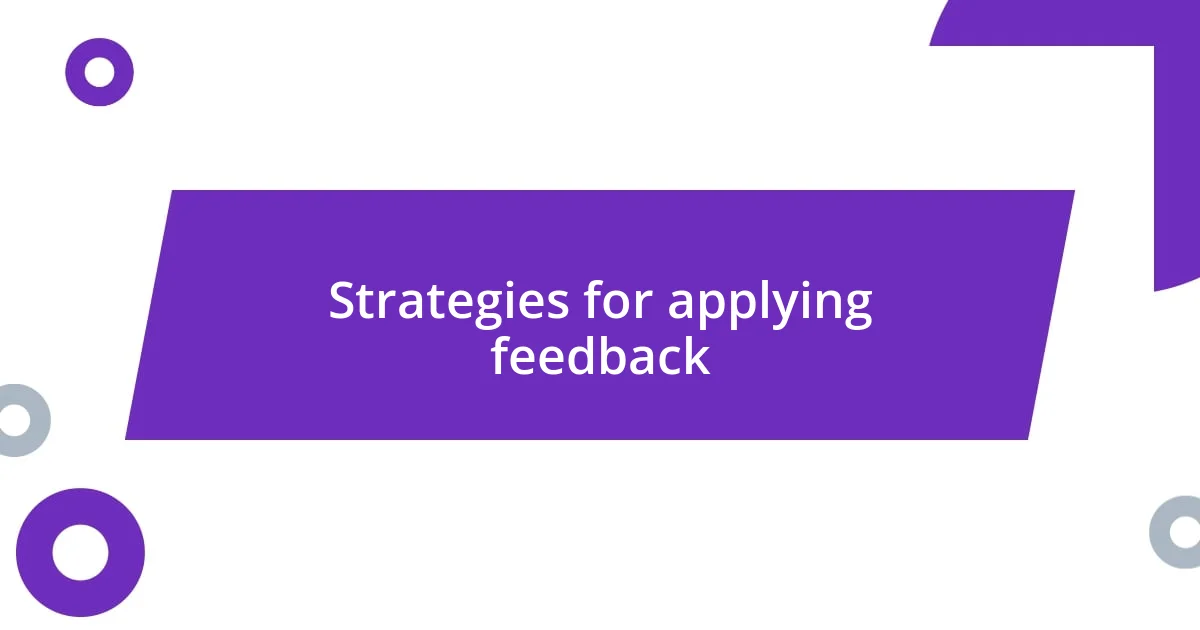
Strategies for applying feedback
One strategy I find incredibly effective is breaking down the feedback into actionable steps. When I receive a critique that feels overwhelming, I take a step back and sort it into categories—what I can implement immediately versus what requires more reflection. For example, after a particularly tough presentation review, I prioritized the feedback into two lists. Interestingly, I found that focusing on one small change at a time helped me rebuild my confidence while improving my work incrementally.
Another approach I’ve enjoyed integrating is discussing feedback with a trusted colleague or mentor. When I feel uncertain about how to apply suggestions, talking it through with someone who knows my work can provide clarity. I remember once grappling with a substantial critique on my writing style. Sharing my concerns with a mentor opened up a constructive conversation that led to hidden insights about my voice and how I could elevate it. Have you ever considered how collaboration can transform feedback from a solitary burden into a shared journey?
Lastly, I practice self-compassion when applying feedback. This means acknowledging that improvement is part of the learning curve and that it’s okay to stumble along the way. Some days, I remind myself of a project that didn’t go as expected. Rather than fixating on the missteps, I highlighted what I did well and used it as a springboard for future growth. This attitude not only helps me apply feedback with a lighter heart but also cultivates resilience in the face of challenges. Remember, it’s all about progress, not perfection.
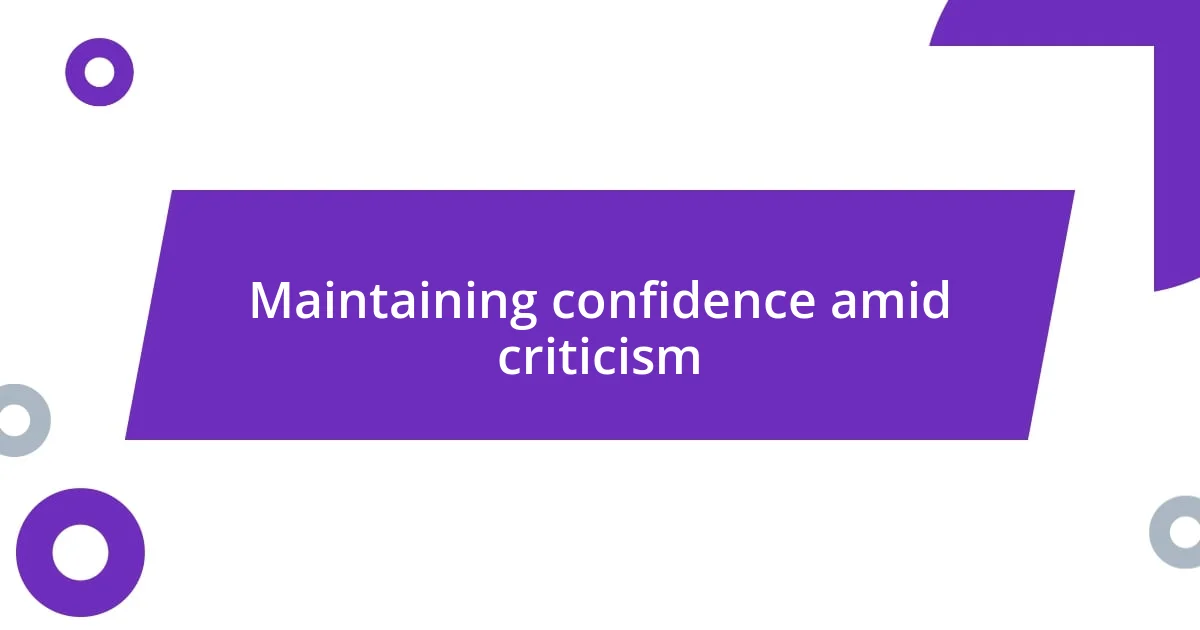
Maintaining confidence amid criticism
Maintaining confidence amid criticism requires a conscious effort to shift my perspective. I remember a time when a mentor laid out some tough feedback on my presentation skills. Instead of feeling small, I focused on the fact that their insights stemmed from a place of genuine investment in my growth. Isn’t it fascinating how reframing a situation can completely change our emotional response?
Another strategy I employ is surrounding myself with a support network that uplifts my spirit. After receiving harsh criticism, I often turn to friends who know my journey. Sharing my thoughts with them not only reassures me but also sheds light on my strengths that I might overlook in challenging times. Have you ever noticed how a few kind words from trusted peers can reignite your confidence?
It’s also incredibly valuable to celebrate even the smallest victories amid criticism. I recall a project where the feedback was overwhelmingly critical, yet I managed to implement a key suggestion effectively. While I could easily dwell on the negatives, I chose to acknowledge that one win. That focus on progress, however slight, cultivates a mindset of resilience. How do you highlight your successes in the face of adversity? I find that even the tiniest achievements can serve as powerful reminders of my capabilities.
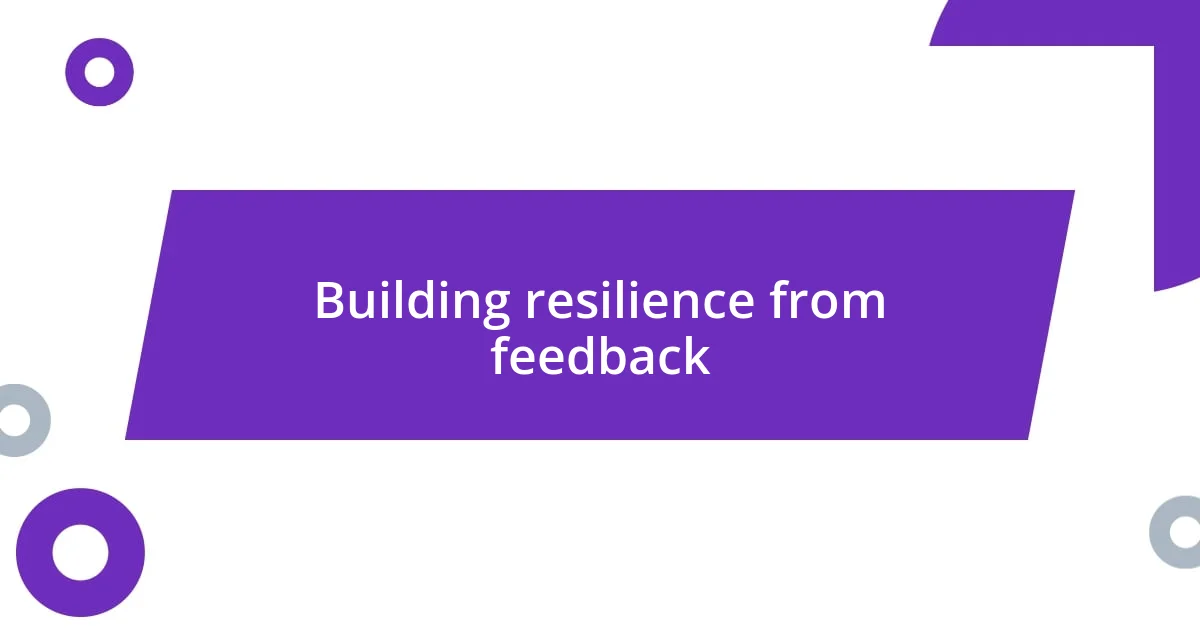
Building resilience from feedback
Building resilience from feedback can be a transformative process if approached with the right mindset. I recall an instance when I received feedback on a project I was passionate about, yet it left me feeling a bit deflated. Instead of wallowing in self-doubt, I decided to view the feedback as an opportunity for growth. Each piece of critical feedback became a stepping stone, propelling me forward rather than holding me back. Have you ever flipped your initial reaction to criticism on its head?
Another critical aspect of building resilience is creating a personal mantra to navigate through the feedback storm. I often remind myself, “This is a chance to get better, not a judgment of my worth.” It’s an empowering shift. I remember a particularly tough review session; I entered feeling anxious, but by embracing this mindset, I left feeling invigorated to tackle my weaknesses head-on. What mindset shifts have you considered to help foster resilience?
Finally, I make it a habit to reflect on past successes when faced with feedback. After receiving advice on a recent blog post, I took a moment to revisit some of my earlier works that received praise. It struck me how far I had come, which infused me with a wave of motivation. This reflection not only reinforced my skill set but also strengthened my resolve to embrace feedback with open arms. Have you ever taken a trip down memory lane to bolster your confidence in challenging times? Those reflections can be a powerful reminder of your growth and potential.


